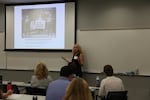With a new law requiring all students to learn about the Holocaust and other genocides, an event in Portland Thursday drew educators from school districts around the state.
OSU’s College of Education hosted a Holocaust and Genocide Curriculum Symposium, where experts and educators shared tips for how to cover genocide accurately and effectively. Attendees also learned about historical and contemporary genocides, and resources to use in teaching these topics in the classroom.

Amanda Kibler is an associate professor in the OSU College of Education.
Elizabeth Miller/OPB
“Educators and other people working in schools and around schools need support to develop, to implement, to really realize the potential of this, a new set of standards,” OSU associate professor of education Amanda Kibler said.
Lessons about genocide are not new to teachers. As an English and language arts teacher at St. Helens High School, Carrie McCallum also teaches a class on holocaust and genocide literature. She started it in 2011.
“We look at the Holocaust primarily, but other genocides as well in different sources,” McCallum said. “Not just literature but also primary source documents, testimonies, things like that.”
McCallum facilitated a couple of conversations at the event on teaching guidelines, lessons and resources. To her, it’s important to offer support to teachers in this work.
“This history can be taught so poorly, and I want to make sure that that’s not going to happen,” McCallum said. “I want Oregon educators to have resources they can use in their classrooms.”
The standards required in the bill are broader than current ones. In addition to knowledge and understanding of the Holocaust and other acts of mass violence, students are expected to develop a respect for cultural diversity and analyze patterns of human behavior. The law also requires students to learn about discrimination in the state of Oregon.

Oregon State history professor Katherine Hubler leads a session on the Holocaust and historical context.
Elizabeth Miller/OPB
“It very powerfully calls out these processes of genocide,” Kibler said. “It calls this out as a very important aspect of what students should know and what they should be able to build on in their lives academically and of course, outside of school.”
Sen. Robert Wagner introduced the bill into the Legislature in January of this year. He was inspired by the friendship between Claire Sarnowski and Holocaust survivor Alter Wiener, who died earlier this year.

The Multnomah County Library offers literature for all ages related to the Holocaust, other genocides, and discrimination.
Elizabeth Miller/OPB
While school districts are required to start teaching about genocide next year, state standards and instructional materials for Holocaust and genocide studies won’t be in place until September 2025.
McCallum said she is excited to see resources devoted to teachers in support of the mandate, including professional development opportunities.
Both McCallum and Kibler hope teachers will be involved in the standards process.
“This is a years-long development process that we're very excited about,” Kibler said.
